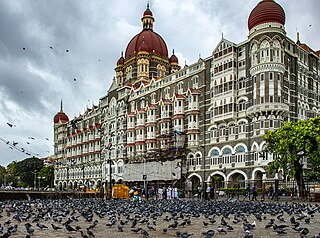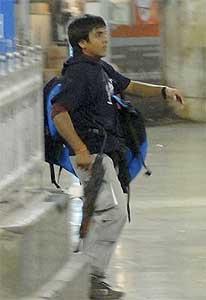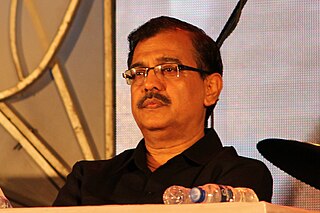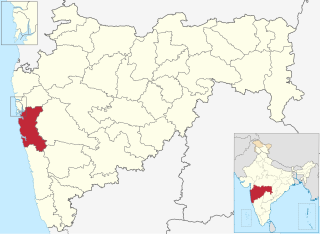Related Research Articles

Chhatrapati Shivaji Maharaj Terminus (previously Chhatrapati Shivaji Terminus, Mumbai station code: CSMT /ST, is a railway terminus and UNESCO World Heritage Site in Mumbai, Maharashtra, India.
The 1993 Bombay bombings were a series of 12 terrorist bombings that took place in Bombay, Maharashtra, on 12 March 1993. The single-day attacks resulted in 257 fatalities and 1,400 injuries. The attacks were coordinated by Dawood Ibrahim, leader of the Mumbai-based international organised crime syndicate D-Company. Ibrahim was believed to have ordered and helped organize the bombings through his subordinates Tiger Memon and Yakub Memon.

The Taj Mahal Palace is a heritage, five-star, luxury hotel in the Colaba area of Mumbai, Maharashtra, India, situated next to the Gateway of India. Built in the Saracenic Revival style, it opened in 1903 as the Taj Mahal Hotel and has historically often been known simply as "The Taj". The hotel is named after the Taj Mahal, which is located in the city of Agra approximately 1,050 kilometres (650 mi) from Mumbai. It has been considered one of the finest hotels in the East since the time of the British Raj. The hotel was one of the main sites targeted in the 2008 Mumbai attacks.

The 2006 Mumbai train bombings were a series of seven bomb blasts on 11 July. They took place over a period of 11 minutes on the Suburban Railway in Mumbai, the capital of the Indian state of Maharashtra and the nation's financial capital. The bombs were set off in pressure cookers on trains plying on the Western Line Suburban Section of the Mumbai Division of Western Railway. The blasts killed 209 people and injured over 700 more.
Anti-Terrorism Squad (ATS) is a special police force in several states of India including Maharashtra, Gujarat, Kerala, Uttar Pradesh, Rajasthan, Bihar, Jharkhand and West Bengal. In Maharashtra, it is headed by senior of the Indian Police Service. The squad has stopped several terrorist attacks in the country including 1991 Lokhandwala Complex shootout & 26/11 Mumbai attacks.
Indian Mujahideen (IM) is an Islamic terrorist group which has been particularly active in India. The jihadist group was founded as an offshoot of the Students' Islamic Movement of India (SIMI) by several radicalized members including Iqbal Bhatkal, Riyaz Bhatkal, Yasin Bhatkal, Abdul Subhan Qureshi, Amir Reza Khan and Sadiq Israr Sheikh, among others. It has been active since at least 2005 when it bombed the Dashashwamedh Ghat in Varanasi. It carried out several serial-bombings in Indian cities in the following years notably the 2007 Uttar Pradesh bombings, 2008 Jaipur bombings, 2008 Ahmedabad bombings, 2008 Delhi bombings, 2010 Pune bombing, 2011 Mumbai bombings, 2011 Delhi bombing, 2013 Patna bombings, 2013 Hyderabad blasts and the 2013 Bodh Gaya bombings.
Events in the year 2009 in the Republic of India.

The 2008 Mumbai attacks were a series of terrorist attacks that took place in November 2008, when 10 members of Lashkar-e-Taiba, an Islamist terrorist organisation from Pakistan, carried out 12 coordinated shooting and bombing attacks lasting four days across Mumbai. The attacks, which drew widespread global condemnation, began on Wednesday 26 November and lasted until Saturday 29 November 2008. A total of 175 people died, including nine attackers, and more than 300 were wounded.

The Nariman House, designated as a Chabad house, is a five-storey landmark in the Colaba area of South Mumbai, Maharashtra, India. The building was home to a Chabad house, a Jewish outreach centre run by Gavriel and Rivka Holtzberg, who had owned the building since around 2006. The centre had an educational center, a synagogue, offered drug prevention services, and a hostel.

Sandeep Unnikrishnan, AC was an Indian Army officer, who was serving in the 51 Special Action Group of the National Security Guards on deputation. He was Martyred in action during the November 2008 Mumbai attacks. He was consequently awarded the Ashoka Chakra, India's highest peacetime gallantry award, on 26 January 2009.

Mohammed Ajmal Amir Kasab was a Pakistani terrorist and a member of the Islamic terrorist organization Lashkar-e-Taiba through which he took part in the 2008 Mumbai terrorist attacks in Maharashtra, India. Kasab, alongside fellow Lashkar-e-Taiba recruit Ismail Khan, killed 72 people during the attacks, most of them at the Chhatrapati Shivaji Terminus. Kasab was the only attacker captured alive by police.
Housing in India varies from palaces of erstwhile maharajas to modern apartment buildings in big cities to tiny huts in far-flung villages. The Human Rights Measurement Initiative finds that India is doing 60.9% of what should be possible at its level of income for the right to housing.
Events in the year 2010 in the Republic of India.

The National Disaster Response Force (NDRF) is an Indian specialized force constituted "for the purpose of special response to a threatening disaster situation or disaster" under the Disaster Management Act, 2005. The "Apex Body for Disaster Management" in India is the National Disaster Management Authority (NDMA). The Chairman of the NDMA is the Prime Minister.

Ujjwal Nikam is an Indian special public prosecutor who has worked on prominent murder and terrorism cases. He helped prosecute suspects in the 1993 Bombay bombings, the Gulshan Kumar murder case, the Pramod Mahajan murder case, and the 2008 Mumbai attacks. He was also the special public prosecutor in the 2013 Mumbai gang rape case, 2016 Kopardi rape and murder case. Ujjwal Nikam argued on behalf of the state during the 26/11 Mumbai attack trial.
On 4 April 2013, a building collapsed on tribal land in Mumbra, a suburb of Thane in Maharashtra, India. It has been called the worst building collapse in the area. Seventy-four people were killed, while more than 100 survived. The search for additional survivors ended on 6 April 2013.
Widespread monsoon flooding occurred in the South Asian countries of Afghanistan, Bangladesh, India, Nepal and Pakistan from July through September 2017. More than 45 million people were affected by the floods, including 16 million children.

On 25 August 2020, a building collapsed in Mahad, India killing at least 12 people and trapping at least 60 others.
References
- ↑ "Probe ordered into building collapse". The Hindu . 24 August 2005. Retrieved 29 August 2015.[ dead link ]
- ↑ Tatke, Sukhada (14 August 2008). "Building collapses due to poor condition; 21 killed". Times of India . Retrieved 29 August 2015.
- ↑ "Mumbai relic kills 11 in sleep". The Telegraph (Calcutta) . 24 August 2005. Archived from the original on 28 October 2005. Retrieved 29 August 2015.
- ↑ "Engineers jailed for collapse". The Telegraph. India. 8 May 2008. Retrieved 3 June 2018.[ dead link ]